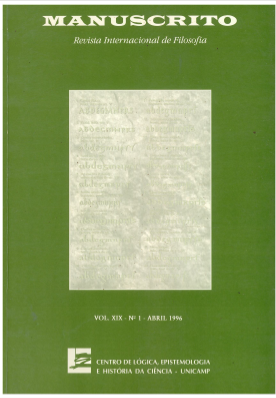Resumo
Husserl developed – independently of Frege - a semantics of sense and reference. There are, however, some important differences, specially with respect to the referents of statements. According to Husserl, an assertive sentence refers to a state of affairs, which has as its basis what he called a situation of affairs. Situations of affairs could also be considered as an alternative referent for statements in their own right, although for Husserl they were simply a sort of referential basis. Both Husserlian states of affairs and situations of affairs are extensional.Tarskian semantics can be rendered as a sort of state of affairs semantics. However, to adequately assess the existence of dual theorems in mathematics and, more generally, seemingly unrelated interderivable statements like the Axiom of Choice and its many equivalents, states of affairs (and truth-values) are not enough. We need a sort of refinement of the notion of a situation of affairs, namely, what we have called elsewhere an abstract situation of affairs. We are going to introduce abstract situations of affairs as equivalence classes of states of affairs denoted by closed sentences of a given language which are true in the same models. We first sketch the procedure for a first-order many-sorted language and then for a second-order many-sorted language.
Referências
Barwise, J. & Feferman, S. (eds.) (1985). Model-TheoreticLogics. (New York/ Berlin, Springer).
Chang, C. C. & Keisler, H. J. (1990). Model Theory, third edition. (Amsterdam, North Holland).
Frege, G. (1892). Über Sinn und Bedeutung, Zeitschrift für Philosophie und Philosophische Kritik, vol. 100, 25-50.
Frege, G. (1918) Der Gedanke, Beiträge zur Philosophie des deutschen Idealismus I, 58-77.
Frege, G. (1962). Grundgesetze der Arithmetik (1893-1903) reprint. (Hildesheim, Olms).
Frege, G. (1964). Begriffsschrift (1879), reprint. (Hildesheim, Olms).
Frege, G. (1976). Wissenschaftlicher Briefwechsel. ed. G. Gabriel, H.Hermes, F. Kambartel, C. Thiel and A. Veraart (Hamburg, Felix Meiner).
Frege, G. (1986). Die Grundlagen der Arithmetik (1884.) Centernarausgabe, ed. Christian Thiel (Hamburg, Meiner).
Frege, G. (1991). Kleine Schriften, ed. I. Angelelli, second edition. (Olms, Hildesheim).
Husserl, E. (1975) & (1984a). Logische Untersuchungen (1900-1901), Husserliana edition, Vols. XVIII & XIX. (The Hague, Kluwer).
Husserl, E. (1976). Erfahrung und Urteil (1939) fifth edition. (Hamburg, Felix Meiner).
Husserl, E. (1984b). Einleitung in die Logik und Erkenntnistheorie, Husserliana Vol. XXIV. (Dordrecht, Kluwer).
Husserl, E. (1987). Vorlesungen über Bedeutungslehre, Husserliana, Vol. XXVI. (Dordrecht, Kluwer).
Moore, G. H. (1982). Zermelo's Axiom of Choice. (New York, Springer).
Moschovakis, Y. N. (1994). Notes on Set Theory. (New York, Springer).
Rosado Haddock, G.E. (1982). Remarks on Sense and Reference in Frege and Husserl, in Kant-Studien 74, nº 4, pp. 425-439.
Rosado Haddock, G.E. (1986). 'On Frege's Two Notions of Sense', in History and Philosophy of Logic, 7, nº1, pp. 31-41.
Rosado Haddock, G.E. (1991). 'On Husserl's Distinction between State of Affairs (Sachverhalt) and Situation of Affairs (Sachlage)', in Seehbohm et al. (1991), pp. 31-48.
Rosado Haddock, G.E. (1992). 'Interderivability of Seemingly Unrelated Mathematical Statements and the Philosophy of Mathematics’, Diálogos 59, January, pp. 121-134.
Rubin, H. & Rubin, J. E. (1985). Equivalents of the Axiom of Choice II. (Amsterdam, North Holland).
Seebohm, Thomas S. et. al. (eds.) (1991) Phenomenology and the Formal Sciences (Dordrecht, Kluwer).
Shapiro, S. (1991). Foundations without Foundationalism.(Oxford, Oxford University Press).
Tarski, A. (1933). Pojecie prawdy w jezykach nauk dedukcyjnych (Warsaw).
Tarski, A. (1935). Der Wahrheitsbegriff in den formalisierten Sprachen, Studia Philosophica, I, 261-405.
Tarski, A. (1983). The Concept of Truth in Formalized Languages' in A. Tarski Logic, Semantics, Metamathematics, second edition, ed. John Corcoran (Indianapolis, Hackett).
Tarski, A. (1969). Truth and Proof, reprint in Tarski (1986) pp. 399-423.
Tarski, A. (1986). Colllected Works, vol. II (Boston, Birkhäuser).
Von Kutschera, F. (1989). Gottlob Frege. (Berlin, De Gruyter).

Este trabalho está licenciado sob uma licença Creative Commons Attribution 4.0 International License.
Copyright (c) 1996 Manuscrito: Revista Internacional de Filosofia

